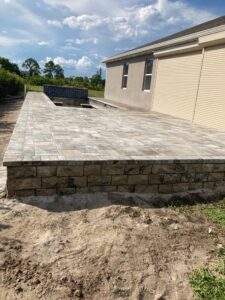Pros & Cons of Brick Pavers
Brick pavers are a popular choice for outdoor spaces, offering a blend of durability, aesthetic appeal, and versatility. However, like any material, they come with their own set of advantages and disadvantages. In this blog post, we’ll delve into the pros and cons of brick pavers, and with our expert advice help you make an informed decision for your next project. You can always reach out to V&J Quick Pavers or call us at (239) 247-9750.
Pros of Brick Pavers
- Durability: Brick pavers are known for their strength and longevity. Made from natural clay materials, they can withstand heavy loads and high foot traffic without cracking. This makes them ideal for driveways, walkways, and patios.
- Aesthetic Appeal: One of the main attractions of brick pavers is their timeless beauty. They come in a variety of colors, shapes, and sizes, allowing for creative and unique design patterns. The natural, earthy tones of brick pavers can complement any landscape or architectural style.
- Environmental Friendly: Brick pavers are made from natural clay and shale, which are abundant and eco-friendly materials. Additionally, brick pavers can be recycled and reused, reducing their environmental impact.
- Versatility: Brick pavers can be used in various applications, from driveways and walkways to patios and pool decks. Their versatility makes them a favorite among homeowners and designers.
Maintenance
- Maintenance: Brick pavers require minimal upkeep. They can be easily cleaned with a broom, hose, or pressure washer. Their color remains vibrant over time, and they are resistant to stains, especially when properly sealed.
- Easy Repair: If a brick paver becomes damaged, it can be replaced individually without disturbing the surrounding pavers. This is a significant advantage over concrete slabs, which may require extensive repairs if damaged.
- Can Become Slippery: In wet conditions, brick pavers can become slippery, posing a hazard in certain areas. Choosing pavers with textured surfaces or adding anti-slip treatments can help address this concern.
Cons of Brick Pavers
- Higher Initial Cost: The upfront cost of brick pavers can be higher compared to other paving materials like concrete or asphalt. However, their long-term durability and low maintenance requirements can offset the initial investment over time.
- Potential for Weed Growth: The joints between brick pavers can become breeding grounds for weeds and grass. Regular maintenance, such as sealing and using joint sand stabilizers, can help minimize this issue.
- Labor-Intensive Installation: Installing brick pavers can be a labor-intensive process, requiring precise leveling and alignment. This often necessitates professional installation, which can add to the overall cost.
- Risk of Shifting: Without proper base preparation and edge restraints, brick pavers can shift or settle over time, leading to uneven surfaces. Ensuring a solid and well-prepared base can mitigate this risk.
- Limited Color Range: While brick pavers offer a range of natural colors, they are somewhat limited compared to the variety of hues available with concrete or other materials. However, their classic and timeless appeal often outweighs this limitation.
Final Thoughts
Brick pavers offer a blend of durability, aesthetic appeal, and environmental benefits that make them a popular choice for outdoor projects. While they come with a higher initial cost and potential maintenance challenges, their long-term advantages often outweigh these drawbacks. By considering the pros and cons, you can determine if brick pavers are the right fit for your specific needs and preferences.
At V&J Quick Pavers, we specialize in the best practices for cleaning, sealing, and maintaining brick pavers. Our team of experts is dedicated to helping you achieve a beautiful and durable outdoor space. For more information or to schedule a consultation, visit our website or call us at (239) 247-9750. We’re here to ensure your brick paver project is a success!




